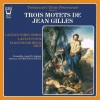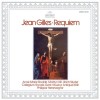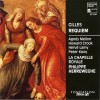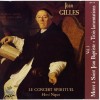Composers
Jean Gilles (January 8, 1668 – February 5, 1705) was a French composer, born at Tarascon.
After receiving his musical training as a choirboy at the Cathedral of Saint-Sauveur at Aix-en-Provence, he succeeded his teacher Guillaume Poitevin as music master there. After moving on several times, he became music master at the Cathedral of St Etienne at Toulouse in 1697, as the successor of André Campra. His musical style was influenced by Campra, as were most musicians of his day. He composed motets and a famous requiem, which was performed for the first time at his own funeral (because the original commissioner thought it too expensive to perform), but was later sung at the funeral services for the Stanisław Leszczyński, King of Poland in 1736, Jean-Philippe Rameau in 1764, and Louis XV in 1774. His motets were played frequently[1] from 1728 to 1771 at the Concert Spirituel.
His choral works often alternate passages sung by the soloists with those sung by the chorus. In 1752, in Lettres sur les hommes célèbres du règne de Louis XIV, Pierre-Louis d'Aquin said that Gilles would doubtless have replaced Lalande if he had lived long enough. Gilles died suddenly at the age of 37 in Toulouse.
Recently Added
Biography
Jean Gilles (January 8, 1668 – February 5, 1705) was a French composer, born at Tarascon.
After receiving his musical training as a choirboy at the Cathedral of Saint-Sauveur at Aix-en-Provence, he succeeded his teacher Guillaume Poitevin as music master there. After moving on several times, he became music master at the Cathedral of St Etienne at Toulouse in 1697, as the successor of André Campra. His musical style was influenced by Campra, as were most musicians of his day. He composed motets and a famous requiem, which was performed for the first time at his own funeral (because the original commissioner thought it too expensive to perform), but was later sung at the funeral services for the Stanisław Leszczyński, King of Poland in 1736, Jean-Philippe Rameau in 1764, and Louis XV in 1774. His motets were played frequently[1] from 1728 to 1771 at the Concert Spirituel.
His choral works often alternate passages sung by the soloists with those sung by the chorus. In 1752, in Lettres sur les hommes célèbres du règne de Louis XIV, Pierre-Louis d'Aquin said that Gilles would doubtless have replaced Lalande if he had lived long enough. Gilles died suddenly at the age of 37 in Toulouse.











